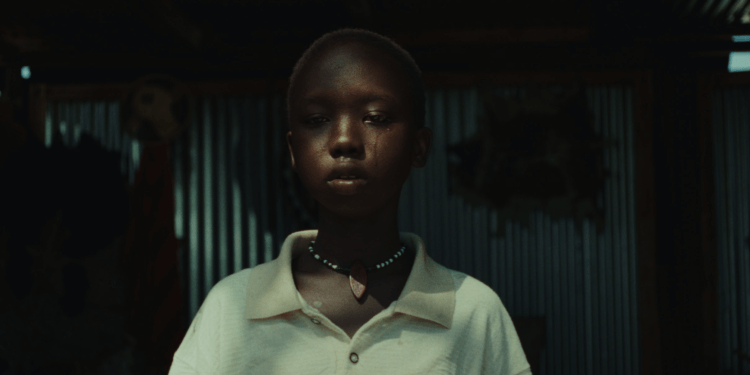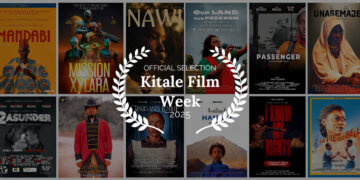Nawi, a film produced by Lydia Wrensch, Caroline Heim, Brizan Were, opened to a packed fanfare at the Anga Panari Cinema with the elegance of an international premiere. The audience, which included film lovers, Turkana natives, and notable dignitaries such as Kenya Film Commission CEO Timothy Owase, a cabinet secretary for the East African community, a deputy governor, and Turkana senator, hinted early on that this was not just any film.
Based on a winning story by Milcah Cherotich from a nationwide writing contest, and unique in both style and texture, Nawi explores the lives of girls in Turkana from a perspective previously limited to news banners and filtered discussions, positioning itself as a voice for a voiceless and often muted group of Kenyan girls.
“Sixty sheep, six camels, and a hundred goats,” repeated over and over throughout the film, represents the price tag that the titular Nawi, a fourteen-year-old Turkana girl, is brandished with by her family and community at large. Inspired by true events, this story chronicles Nawi’s journey of self-discovery as her moment of intellectual triumph, topping the county in the national examination, is quickly stifled by an arranged marriage to a much older man (played by Benson Ojuwa, Untying Kantai), orchestrated by her father. The events that follow see the budding spirit of the smart, unrestrained, and defiant girl manoeuvre through the deeply patriarchal deluge of the men around her as she seeks to find her way towards her dreams of leaving her small world and eventually landing in the prestigious Alliance Girls to become her future self.
German directors Toby and Kevin Schmutzler, and Kenyan directors Vallentine Chelluget and Apuu Mourine crafted Nawi as an artistic representation of the lives and livelihoods of the Turkana people, depicting their stories with a raw and dignified intentionality that overtly simplifies them to their most digestible rudiments. While the film at times feels like one guided by diverging voices, it ends up as a portrait of a sum of the best of these individual artistic voices. Every single frame of Nawi is beautiful. The cinematography shines through, delivering picturesque landscapes and intimate close-ups, rarely wasting a frame. The music is pristine, with parts almost reminiscent of Hans Zimmer’s score for Dune, and the two combine to deliver some of the most visually compelling scenes one could ask for.
Steered by the hopeful and irreproachable gaze of newcomer Michelle Lemuya Ikeny playing Nawi, the performances are a mixed bag of apprehensible highs and wincing lows. As a young actress, Ikeny shines through with the poise and maturity that carry the film. An array of seasoned actors flanks her, including Benson Ochungo (Mpakani) as her stern father, Michelle Tiren (Volume) as her reserved mother, Marrianne Nungo (Pepeta) with a more assiduous take as the household matriarch, and Nyokabi Macharia (Country Queen) as her stout teacher and mentor, all who bring a much more nuanced and measured identity to the film. With Nawi speaking with wisdom beyond her years, her brother (Joel Liwan) almost dubbed into suave and inapt mannerisms, and her family diluted into a universal caricature of what is expected of backward kindred, it’s fair to say the film is less pronounced in the voice of the people it represents and more in the voice of its message.
What is clear, however, is the gravity of that message. The countless girls lost to early marriages and the illimitable dreams that are taken away from these children by a society that only values them as a means for the predatory transactions of inherited traditions. For the majority of the runtime, the film poignantly draws out, in heart-wrenching detail, the visceral claws that hunt girls like Nawi down and the agonising toil the fight against it takes on the children in the most formative period of their childhood. In this regard, Nawi is a triumph for the delicate manner in which it handles its protagonist’s plight, going above and beyond its scope to reiterate the value of her dreams and the futility of her struggle, opening itself as a dialogue between the ambitious expressions of progress and the static restraints that parts of traditions continue to instil. So much so that at times, the film becomes engrossed in its own storyline, overextending scenes, and indulging in arguments that distract its viewers. However, when it’s all said and done, Nawi ultimately navigates through the heft of its themes to provide a satisfying resolution to its narrative.
KFC recently announced Nawi as Kenya’s entry for the Oscars 2025 in the Best International Feature category, a selection I don’t mind as it stands above all Kenyan films already released this year that I’ve watched. However, with films like Nawi, despite my adoration for its beauty and delicate balance of delivering a progressive message, I always feel a little sad that at the heart of it, the antagonist is predominantly African culture. There is no denying that some aspects of these cultures do more harm than good, but I like to think that narrowing the scope to only those aspects ends up vilifying even the good. This film, for instance, by being so female-focused, has a scene where a boy is forced into a rite of passage that intuitively feels like a punishment and even after becoming a man, this boy still has to live under the shadow of his sister when the duality of their relationship could have offered a sense of what self-discovery could mean for a new generation of men in that society. For the majority of the film, Nawi expresses her desire to escape her small world, and the film provides ample justifications for her wish. I can’t help but wonder how refreshing it would be to witness a film where local characters choose their traditions, the good ones, if only to accentuate their positive aspects and not as a rejection of connoted progress. Maybe next time.
Also Read: Kenya at the Oscars and Why We Must Put More Thought into Our Submissions











